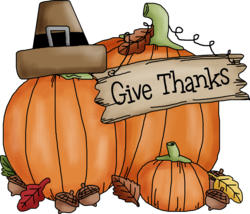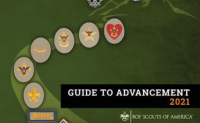 Thanksgiving has become a speed bump in the marketing cycle that starts before Halloween and continues all the way to Christmas and beyond. In the past, it marked the beginning of the holiday shopping season. In recent years, retailers have been tripping over themselves to attract customers by cutting prices and opening earlier. Forget about opening at the usual hour of nine or ten AM on what has come to be called Black Friday. Midnight is no longer early enough as evidenced by some of the big stores opening up Thanksgiving evening and even late in the afternoon. (But, kudos to REI Co-Op, outdoor retailer and favorite supplier of Scouts, for giving its associates Friday off to go out and appreciate the outdoors.)
Thanksgiving has become a speed bump in the marketing cycle that starts before Halloween and continues all the way to Christmas and beyond. In the past, it marked the beginning of the holiday shopping season. In recent years, retailers have been tripping over themselves to attract customers by cutting prices and opening earlier. Forget about opening at the usual hour of nine or ten AM on what has come to be called Black Friday. Midnight is no longer early enough as evidenced by some of the big stores opening up Thanksgiving evening and even late in the afternoon. (But, kudos to REI Co-Op, outdoor retailer and favorite supplier of Scouts, for giving its associates Friday off to go out and appreciate the outdoors.)
The holiday itself features parades, football games and gut-busting dinners shared around a table with families, with all the friction you might expect. Recently, young adults have been holding informal gatherings called “Friendsgiving” with a meal resembling a potluck dinner, plenty of convivial conversation and a celebration of the season. It’s as if the younger generation is seeking to experience something that society in general has abandoned – a sense of gratitude, family and community.
The celebration of Thanksgiving anecdotally dates back to the Pilgrims, who marked the first harvest in the New World in 1621 with a three-day celebration. As early as 1789, our first President, George Washington, proclaimed the fourth Thursday of November that year
to be devoted by the People of these States to the service of that great and glorious Being, who is the beneficent Author of all the good that was, that is, or that will be.
After being observed off and on thereafter, President Abraham Lincoln declared the final Thursday in November as a national Day of Thanksgiving, and was celebrated regularly thereafter. It became an official Federal holiday when President Franklin D. Roosevelt signed a bill into law in December of 1941.
A Scout is Thankful isn’t one of the twelve points of the Scout Law. There’s really nothing that directly references gratitude among our mission and values, but it’s an essential component in what we are trying to instill in our youth. A sense of gratitude is effective in encouraging the spirit of cooperation and service to others that we embody in our everyday lives.
Gratitude goes beyond appreciating material things. We can be thankful for our family, friends and those around us – even strangers – and the things they do for us and that they allow us to do for them. Scouts can feel gratitude when everyone in the patrol pulls together to go on a hike or cook dinner. Adults can similarly appreciate the talents of our fellow Scouters and the things that they volunteer to do in order to make Scouting happen for our youth.
I’ve written in the past about gratefulness and being thankful of our fellow Scouters. In Who Do We Appreciate?, I described ways to show appreciation to those adults in your unit who help make the pack or troop go. You can show appreciation by just saying Thank You, but there are other simple ways to make a meaningful statement of thanks.
in Why Do We Enjoy Being Scouters?, I explored some thoughts about how people feel appreciated when you pay attention to their needs, input and feelings, and show appreciation for what they do. Showing respect and listening to them for new ideas goes a long way to having a positive relationship.
One of my favorite articles wasn’t written by me. My good friend and Scouting colleague Clarke Green wrote a piece called Extraordinary People and included it in one of his first podcasts. It’s a lighthearted look at what we dedicated Scouters do, really without thinking much about it. I’ve transcribed Clarke’s essay and provided an audio recording.
Enjoy your Thanksgiving holiday and give grateful thanks to those around you. I join Clarke in saying: Thanks for being a Scouter.
This post first appeared on Bobwhite Blather.



